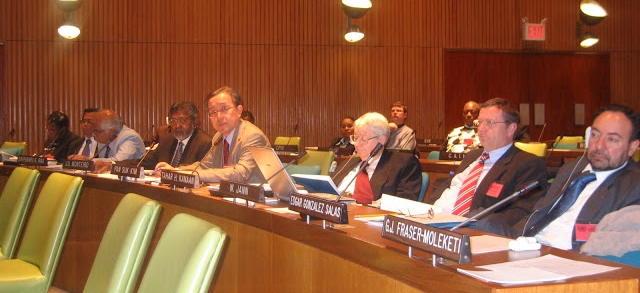The Committee of Experts on Public Administration held its seventh session at the United Nations in New York from 14 to 18 April 2008. Its theme was “Building governance and public administration capacities for development, including in crisis and post-conflict situations”.
Report
Arabic | Chinese | English | French | Russian | Spanish
Subtopics | Major recommendations/conclusions |
|
Capacity-building for the MDGs | The Economic and Social Council should: - reiterate to Member States the need to monitor the progress made towards the achievement of the MDGs. That would include public reporting to citizens, including time-bound targets and national/subnational action plans, as appropriate. Such public reporting would require shared accountability for results on the part of both elected leaders and professional public servants;
- emphasize the importance of national evidence-based reporting, with sets of data disaggregated by socially relevant categories such as gender, income levels, age groups and sub-national aspects. The good practices and innovative methods of gender mainstreaming undertaken by different ministries or organizations can be operationalized and disseminated through disaggregated data. In this way, an effective exchange of information based on comparable data and targets can culminate in effective learning and successful replication;
- urge Member States to prepare an inventory of good administrative policies and practices implemented to support the MDGs. Such an inventory would include the necessary capacities, institutional preparedness aspects and a strategic vision concerning a modern civil service.
The United Nations system, particularly the Department of Economic and Social Affairs and other concerned bodies, should support these efforts. |
|
Capacity-building for post-conflict reconstruction | Public administration reconstruction in a post-conflict environment needs to be undertaken at the systemic and societal levels (State-building, legitimacy, and leadership), the organizational level (public administration bodies and agencies) and the individual level (public sector ethos, citizenship, trust, allegiance). In such contexts, reconstruction should start, if possible, before the end of conflict. With these criteria in mind, the Secretariat should compile lessons learned in post-conflict recovery and reconstruction. Early warning systems for future conflicts should be identified and mechanisms put in place to eliminate possible sources of conflict. |
|
Capacity-building for disaster management and preparedness | Member States should: - conduct post-crisis evaluations and research through, inter alia, white papers;
- make such reports publicly available so as to enhance transparency and accountability in the management of the resources allocated to disaster management;
- work to make the publicly available evaluations on post-crisis interventions into international standards for excellence in crisis management. Such evaluations could be carried out on a country-by country basis or through peer review or other means, this allowing Member States to exchange information on best practices and lessons leant related to disaster risk management;
- develop capacities at the individual level through the training of public servants in the discipline of disaster management.
Since disaster management is an emerging field in public administration, the Department of Economic and Social Affairs should expand its activities in this area, including through community-based approaches. The Department should also initiate the development of a “minimal toolkit” for public administrators that addresses issues related to disaster management. The Secretariat should consider the feasibility of creating a working group or task force jointly with other relevant international organizations (including the relevant functional commissions of the United Nations) in the field of disaster management. Through such a working group, the Committee could endeavour to raise global awareness of disaster management within public administrations and create a trans-administrative response. |
|
Annual Ministerial Review Theme | Major recommendations/Conclusions |
|
Implementing the internationally agreed goals and commitments in regard to sustainable development | - Regarding the gap between global discourse and the country-level implementation of effective environmental policies, the Committee stressed results based management and the operationalization of criteria for expected achievements in the area of environmental sustainability.
- Regarding the inadequate transfer of technology between the developed and the developing worlds, the Committee emphasized the varying requirements of countries and the need to address the reasons behind the lack of technological capacity.
- Regarding the challenge of inter-agency and inter-organizational dialogue, the Committee stressed the dissemination of information on how environmental concerns cut across different ministries and governance actors. The Committee also highlighted the importance of inter-organizational communication and the role played by the United Nations in facilitating capacity-building, training and multi stakeholder meetings.
- The Committee identified the leadership of a few countries whose borders include large ecosystems as being a propitious start to the process of forging greater international consensus and cooperation on environmental sustainability.
- Also, the Committee discussed different methodologies with respect to environmental sustainability and sustainable development. It considered the trade-offs of regulating industrial manufacturers globally versus creating incentive structures for modifying consumption patterns and behaviours.
- Overall, the Committee stressed the importance of clarifying and demonstrating linkages among (a) economic growth, poverty and the environment; (b) capacity development, the environment and governance; and (c) the environment and the Millennium Development Goals.
|
 Bienvenue aux Nations Unies
Bienvenue aux Nations Unies
